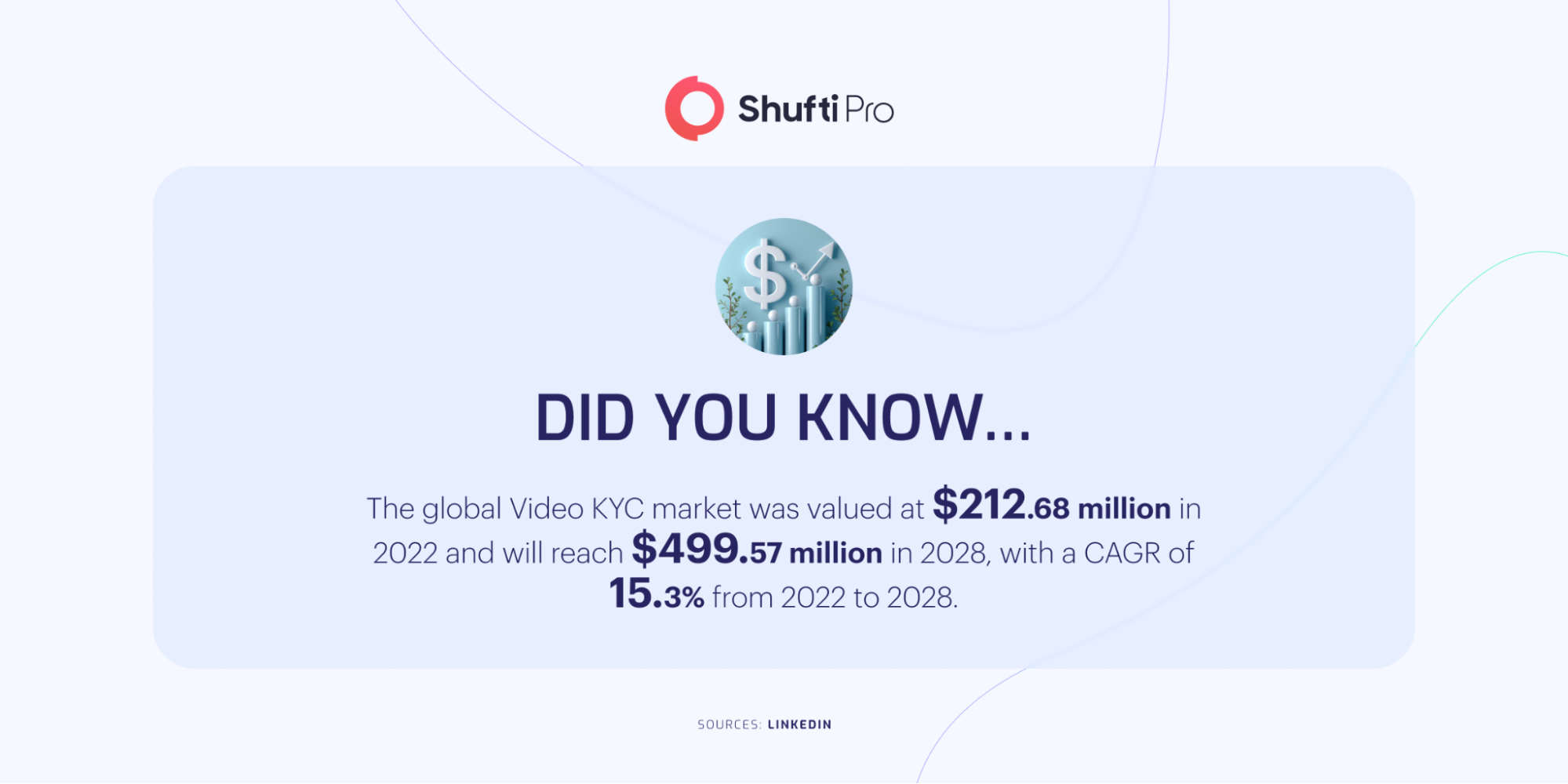Revolutionizing the Finance Sector | VKYC’s Impact on Identity Verification in 2024

Identity verification is crucial in today’s ever-evolving digital landscape as it helps prevent identity fraud, reduces financial crime, and maintains regulatory compliance across multiple sectors, ultimately contributing to a safer digital experience for users and companies. With the advent of advanced automation technology and machine learning algorithms, identity verification has benefited drastically, and identities can now be verified quickly and accurately. AI-driven identity verification systems are more secure, cost-effective, and reliable than traditional manual methods.
A significant advancement in the Identity Verification (IDV) sector is that of video KYC (VKYC), which allows companies to verify passive and live video outputs obtained from potential customers and clients. The global video KYC market is experiencing significant growth, with a projected market size of $499.57 million in 2027 and a Compound Annual Growth Rate (CAGR) of 15.3%. Major tech giants globally are moving towards live VKYC and other verification mechanisms, which are more secure and efficient ways to verify identities than traditional IDV methods and are expected to grow further in the coming years.
What is VKYC? The Workflow and Types
Video KYC (VKYC) is a method of verifying the identity of an individual or entity by leveraging video capabilities. Primarily, this process leverages the power of AI-based recognition techniques to determine whether an entity is real, ultimately determining its extent of risk. This process can be carried out on a pre-recorded video and on a live video call, where a KYC expert conducts a formal verification check on the individual. However, automated VKYC checks are now more dominant as they are cost-effective, time-efficient, and drastically more accurate than traditional KYC checks.
-
Manual KYC Video Check
A KYC interview involves either analyzing a pre-recorded video that the user in question is assigned from the business or conducting a live interview with the individual using a video call platform. This process involves a KYC expert determining whether to onboard an individual by efficiently verifying their identity. The KYC expert subjects the individual to several well-positioned questions and prompts them to perform specific actions, such as displaying their legal document. The primary purpose of these tasks is to perform a liveness detection test on the individual, which not only verifies their legal status but also ensures that the business is not dealing with a deepfake or a fabricated identity that may be used to perpetrate crimes of grave extent.
VKYC firewalls are often implemented to streamline the onboarding process or protect access to sensitive parts of a business. A user is presented with a prompt that requires them to perform specific actions that are put in place to verify all KYC aspects effectively. Once the user submits their video, it undergoes a meticulous review by KYC experts to ensure the accuracy of the information provided. If the review is successful, the user is granted access to the system. However, if the review fails, the user is denied access to the system.
-
Automated VKYC Check
By leveraging technologies such as automation, machine learning, and biometric facial recognition, businesses can automate their video verification processes and achieve better security with improved accuracy. Companies can integrate such video call KYC services using a robust API into their onboarding processes or checkpoints that require validation before granting access. In a standard case, a user is prompted to record a video while performing specific actions, such as displaying legal documents and performing liveness detection features, verified on the spot to grant access.
Automated KYC checks can monitor the whole login and document upload processes or specific sections out of the segment, which is then used to verify the user. An automated VKYC check is better than a live check, as it does not require a manual check from the business end and saves significant time. An automated video capture doesn’t require a live KYC agent, offering a better user experience and making it much easier to scale with a minor team and fewer resources. These solutions have an automated workflow and flag suspicious behaviors instantly by verifying users in real time, which creates a more secure and efficient verification process. Additionally, automated VKYC checks are more secure as users can submit documents securely, and the risk of fraudulent activity is much lower.

VKYC in the Finance Sector: Advantages and Considerations
Video KYC for banks provides exhaustive verification processes ranging from biometric facial authentication for liveness detection to OCR for robust document authentication, which allows companies to verify users in real-time and build a more secure environment. Businesses in the financial sector require efficient verification as they are always at an increased threat of cybercrime and fraud because they deal in high-stakes transactions and possess valuable data that can be utilized to commit crimes of a more grave nature. Cybercriminals specifically target businesses in this sector, as they have an opportunity to get greater returns on their pre-planned strategies of fraud and crime.
Video KYC banks can utilize identity verification to help prevent identity theft and money laundering. The primary application of VKYC for business in the finance sector is during the onboarding process and to monitor users involved in high-volume transactions. It can also help to reduce the risk of cyber-attacks and ensure the safety of customer data.
-
Faster Onboarding
Financial organizations such as banks and fintech institutes can leverage the video KYC procedure to verify and onboard users hassle-free and effectively. A typical onboarding process may take days or weeks as users need to verify documents manually, whereas a VKYC process can verify users within seconds and create a more streamlined onboarding process for improved productivity.
-
Improved Risk Management
VKYC systems can help businesses leverage better risk assessment and management as they verify users in real time with improved accuracy. By implementing a robust VKYC, companies can categorize high or low-risk entities, allowing streamlined decision-making when onboarding customers and providing them with the appropriate access or services. Risk scoring can aid in informed decision-making and enable companies to have a holistic overview of how
-
User Convenience
VKYC provides a more convenient user experience as it allows companies to automate the Know Your Customer (KYC) process and create flexibility and accessibility for users. Users can verify their identity and legal status from the comfort of their homes without needing a physical presence or physical document collection, which can be very time-consuming and financially hefty.
In the finance sector, VKYC, which stands for Video Know Your Customer, has emerged as a powerful tool that provides companies with enhanced data security and enables them to comply with global KYC regulations, thereby creating a safer and more secure business ecosystem. Through the VKYC process, user data is safeguarded from identity thieves, and their finances are protected against the threat of scammers and cybercriminals. However, it is essential to have a robust technological infrastructure to effectively complement the VKYC process.
Video KYC with Shufti’s Award-Winning IDV
Shufti’s robust suite of identity verification solutions provides companies with a comprehensive video KYC verification that verifies entries effectively while adhering to global KYC requirements. With effective real-time verification, our solutions ensure that your business stays safe from the ever-evolving threat of cybercriminals. Shufti offers three VKYC procedures
- A local KYC expert with a native language for a customized experience.
- Their own KYC experts for the verification process.
- Automated AI-based option to perform verification without hiring KYC experts
Still unsure about how VKYC complements the overall verification process and improves accuracy?

 Explore Now
Explore Now













